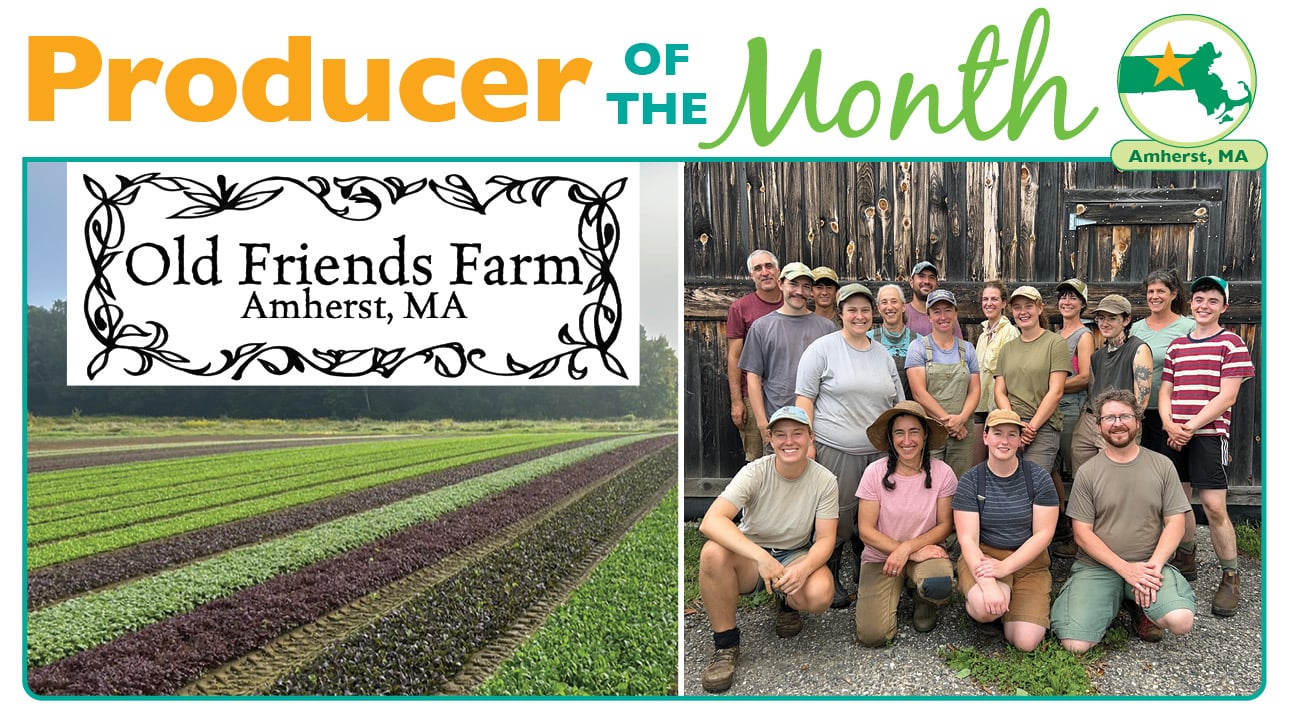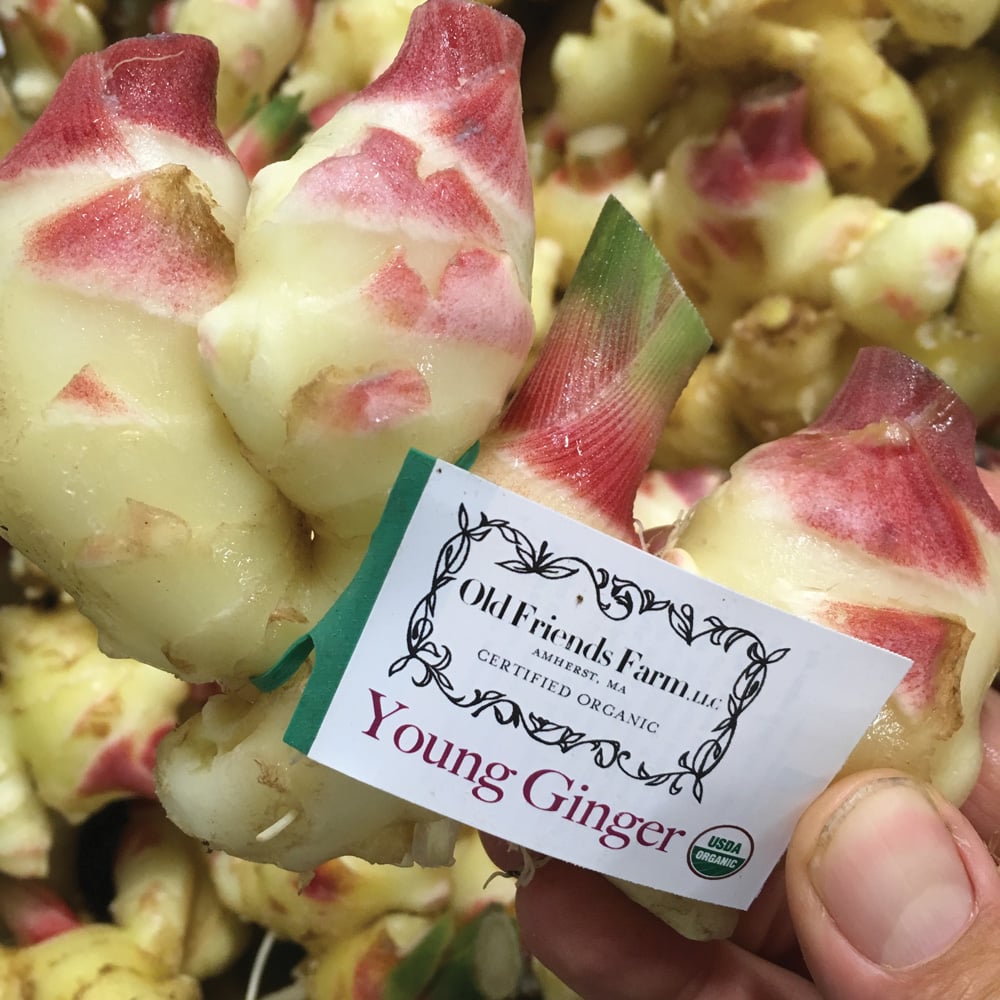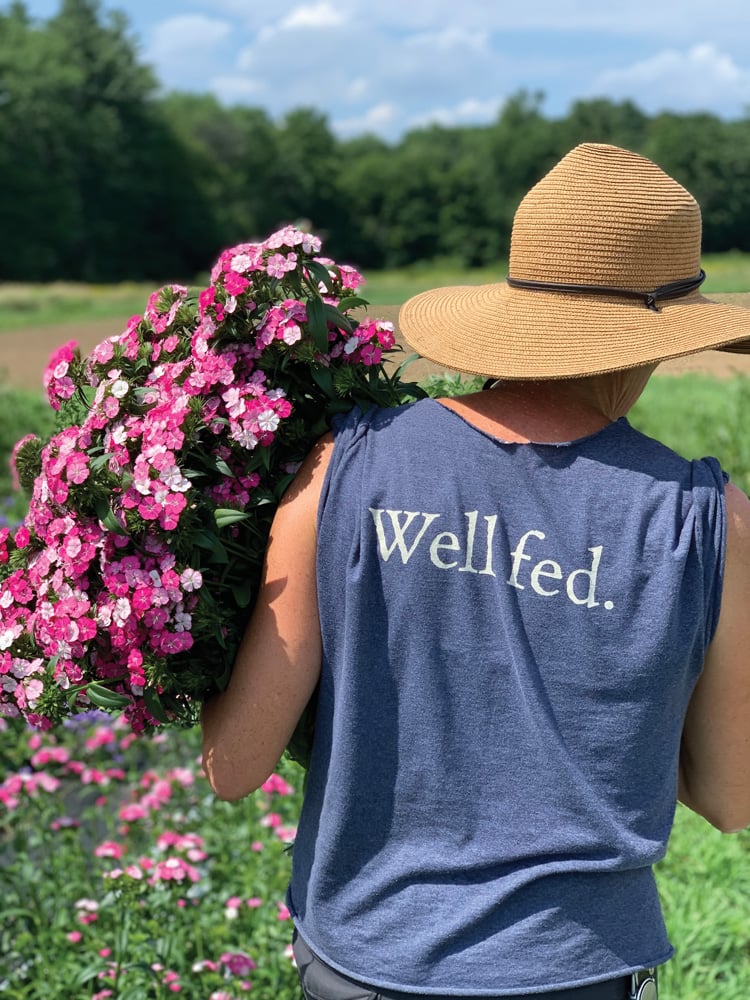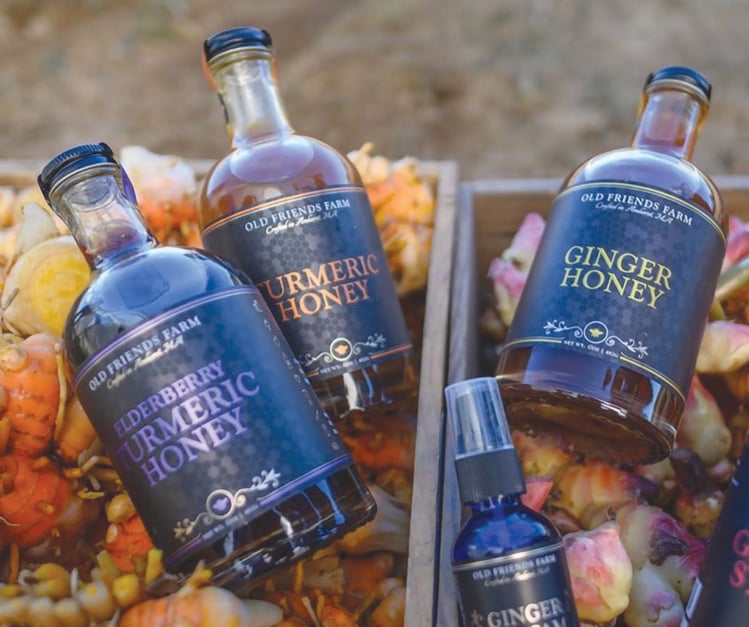Producer of the Month Old Friends Farm

Our four business core values are: Integrity, Balance, Harmony, and Fun.
-Excerpt from Old Friends Farm’s Holistic Goal
Missy Bahret and Casey Steinberg founded Old Friends Farm over twenty years ago in 2003 (and yes, they are old friends). They met while attending the University of Vermont in Burlington, where they both studied outdoor leadership. What started as just the two of them on a tiny plot of land in Western Massachusetts has become a thriving community ecosystem that includes twenty-eight acres of Certified Organic vegetables, flowers, ginger and turmeric, fourteen seasonal and full-time workers, and a host of wild fauna from foxes to great horned owls. They sell their harvests and their award-winning ginger and turmeric honey syrups through our Co-op and scores of other independent grocers and food purveyors around New England and New York.

Old Friends Farm ginger is available Sept. and Oct.
Scattered throughout this article are quotes from Old Friends Farm’s Holistic Goal.1 Every business decision that gets made at Old Friends Farm is filtered through the ideas, principles and spirit of that living mission statement.
FOCUS ON EMPLOYEES
Old Friends Farm is a fun and creative workplace. All people connected with the farm are respected, cared for and valued. This includes employees, owners, and customers alike.
We provide an environment and schedule where everyone can thrive at work and in their off-farm life.
Casey and Missy consider their most important crop to be workplace health. As Missy said, “A farm is only sustainable if people are thriving.”
No matter what time of year it is—whether it’s early spring or the height of the growing season—they strive for a forty-hour work week, including the owners. This is virtually unheard of in agriculture, where people typically work 60-80 hours a week during the growing season. Missy explained it in simple terms: no matter how many or how few hours are worked, in every work day some stuff gets done and some stuff doesn’t. What is different at Old Friends is that people return to work fresh the next day and everyone’s work/life balance is healthier.
Employees also return to the farm year after year, a point of pride for Casey and Missy. Many of their coworkers have been working there for over five years, if not ten or twelve. This also results in a crew that is extremely good at what they do. As a group they are practiced, efficient, stable, and respected. Everyone is given a focus arena: flower arena, pest arena, irrigation arena, tomato arena, etc. Coming back year after year and maintaining that specialization is empowering for the crew and amazing for the farm’s ability to produce incredibly high-quality produce and products. It means that everything that is created under the Old Friends banner is done so with an expert hand.

The handbook Old Friends Farm has created for themselves is one of the keys to staying true to their Holistic Goal. It’s a living, working document: they read through it every year, from top to bottom, with the entire crew. There are always new adjustments and additions. Originally just one piece of paper, it’s grown to over thirty pages long.
When asked if they ever share their handbook with other farms, Missy said they’ve given workshops on how to implement the process of creating one, but she was clear that people need to do this on their own—and start small. They never share the whole document. A thirty-six page booklet would probably result in a lot of, “I don’t have time for that!” But it’s very apparent that the time invested in this clarification of duties, boundaries, and methods has been worth it: the farm supports over a dozen individuals and families with fair wages, reliable schedules, vacation time, and sick time in a positive work culture that allows them to have rich lives outside of their work.
LAND
We manage the farm to be part of a healthy ecosystem.
Old Friends Farm pays attention to the water and mineral cycles, energy flow, and the community dynamics within our ecological ecosystem.
The land is managed to be in better condition with each subsequent year.
Casey and Missy lease the land that Old Friends is on. The equipment, the name, and the “tunnels” (greenhouses) are theirs, but the actual property is owned by the Open Field Foundation, a nonprofit private operating foundation created in 1996 by Gordon Thorne and Anne Woodhull. Though it’s just a mile outside of downtown Amherst and surrounded by houses, a golf course, and big box stores, out in the fields it looks much like the rolling green hills of Vermont. One reason for this is that it’s protected by an Agriculture Protection Restriction (APR). According to www.mass.gov, “The APR Program helps to preserve agricultural land to keep valuable farmland soil from being built on by development companies for non-agricultural purposes that could be detrimental to the environment.”

It’s something of an Eden. Just beyond the tunnels, fields of flowers, blackberry bushes, and carpet-like swaths of salad greens, there is a thriving, abundant, wild landscape filled with a myriad of fauna (coyotes, great blue herons, voles, and great horned owls, just to name a few), flora, and insects of all varieties. Old Friends’ crops and compost production are just one element of the balance of all this life.
GROWING SYSTEMS
The farm keeps excellent records, has good communication and grounded decision making.
Our business is part of a safe, diverse, and accepting community that values the connection between local food, balanced ecosystems, and human health.
Much like the way that each employee at Old Friends has a specialization, so, too, the crops are specialized. When they started the farm, Casey and Missy didn’t want to encroach on other farms, both for their own ability to sell their harvests and out of respect for other farms. Initially they only grew flowers. Over time, they’ve expanded far beyond that, but they still grow gorgeous dahlias, sunflowers, ranunculus, stock, larkspur, dianthus, and more . And early on they decided to pursue other unique produce that had not yet entered the local food marketplace: ginger and turmeric.
Old Friends Farm pioneered the growing techniques for ginger and turmeric in New England. With the support of a SARE grant (short for Sustainable Agriculture Research and Education), they developed practices and methods for growing ginger and then shared that knowledge with other farmers. It’s because of their initiative that ginger and turmeric have become more common crops in our area.
During the interview for this article, a small contraption that looked like a mini skateboard with two large wheels was on the ground in one of the tunnels. Casey had made it just a couple days previously to improve the job of trimming and harvesting one of their crops. Missy relayed some suggestions from one of the crew members who had used the new tool for how to improve the design. It was a real-time example of how they approach their work: with freshness and creativity, and refinement of processes that takes employee input seriously.
At another point, during a conversation about systems they use in their work, Missy talked about the importance of putting tools away in their proper place. It may seem like such a small thing, but her explanation was deep: when you have to go looking for something, it drags the energy down. When things are where they’re supposed to be—when systems are really humming and the cogs are greased—the crew can stay in a different, elevated space. The energy stays up, and the hard work doesn’t seem grueling. It’s more fun, more upbeat, and just more functional. One gets the sense that the efficient organizational systems and focus on the wellbeing of their coworkers are of a piece—different threads in the same tapestry of care.
HONEYS
We grow and create high quality products in a positive work space.
We are adaptable and proactive about change and future needs of the farm.
Old Friends Farm syrups, honeys, and other specialty products grew out of a desire to give their crew members work during the winter months, and provided a way of using ginger and turmeric root that was too small or damaged. (When it’s fresh, ginger and turmeric are a lot more delicate than what you normally find on produce department shelves. In particular, the ginger is a beautiful, creamy translucent yellow, with a splash of fuschia where it meets its stalk. The skin is thin, and the actual root is much less fibrous, more crunchy and cool almost like a cross between a water chestnut and celery.)

Find Old Friends Farm honeys in the Produce Department.
The honeys are one of their only items that are not certified organic, and they explained that there is a very good reason for this. It’s almost impossible to certify that honey is organic (how can you control where the bees collect their pollen?). In order to have them be organic-certified, they would have had to buy lower quality (but certified organic) honey from Mexico or some other distant land, with no clue about quality, worker protections, or other vital elements of production. They chose an option they feel more aligned with: they buy their honey from Kirk Webster of Champlain Valley Bees & Queens in Vermont, reverently described by Casey as a true genius of beekeeping; he’s able to produce abundant raw honey of the highest quality without the use of any treatments whatsoever. It’s this honey that forms the basis of their ginger honey, turmeric honey, and elderberry turmeric honey. All of the honeys have been finalists for Good Food Awards, which is a high accolade. Out of thousands of entries from all over the United States, Good Food Awards are given to products that are exceptional in their flavor, craftsmanship, and sustainability practices.
LITTLING
With the awareness and attention that typifies the culture of Old Friends Farm, Casey and Missy explained how their own roles have changed over time, and the personal transformation that has accompanied that external shift. Now, instead of spending most of their time with the crops, their job is to support their coworkers in whatever ways help them thrive, and administer the financial and leadership aspects of the farm. They’ve had to let go of a lot of control, and empower others with expertise and decision-making. That’s no small thing for people who had the gumption to start a farm and the will to see it through for so many years. To this end, they delegate, have good boundaries, and have created systems to ensure that this stays true every day.
Casey and Missy call their farm a “little big farm.” Instead of using the immense skill that has collectively been built among themselves and the whole crew at Old Friends to leverage more growth, Casey and Missy are choosing a different path. Casey frequently refers to the idea of “littling”: consciously keeping things small, “farming smarter,” and not giving into societal pressure to grow bigger arbitrarily.
Happily, Old Friends Farm produce and products are delicious, beautiful expressions of the work they put into treating the land and each other with thoughtful intention. Every member of the crew has the energy and inspiration to put some love into their work, and it shows. Missy described her own attentiveness when she’s packing fresh, tender, triple-washed salad greens into their beautifully labeled bags—noticing how full they are, getting it just right. This is what it means to bring their full intelligence and full selves to the task of running Old Friends Farm: expressing care everywhere, in everything they do.
By Ruth Garbus
About Producer of The Month

Shop Online

On Sale Now!

